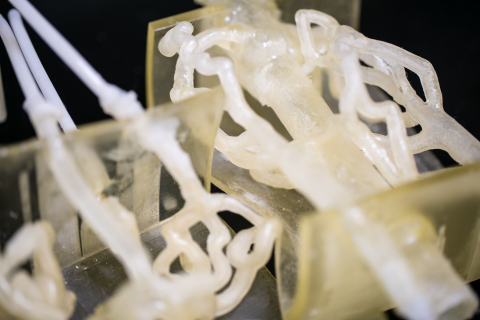MINNEAPOLIS & REHOVOT, Israel--(BUSINESS WIRE)--Stratasys Ltd. (NASDAQ:SSYS), the 3D printing and additive manufacturing solutions company, today announced a major advance in surgical pre-planning led by the power of cutting-edge 3D printed anatomical models. Teaming with Stratasys, The Jacobs Institute (JI) in Buffalo, New York – working alongside physicians at Kaleida Health’s Gates Vascular Institute and biomedical engineers at the University at Buffalo -- designed a revolutionary new approach to repair the complex brain aneurysm for a lucky mother-of-three, Teresa Flint. The lifelike 3D printed replica significantly reduced risks associated with this complex surgery and corrected a near-fatal condition.
“We took the image of the aneurysm based on her scans to generate an exact replica of the entire brain vessel anatomy. The Stratasys 3D printed model enabled us to devise a much more optimal means to treat her,” said Dr. Adnan H. Siddiqui, Chief Medical Officer at The Jacobs Institute, Vice Chair and Professor of Neurosurgery at The Jacobs School of Medicine and Biomedical Sciences at the University at Buffalo. He is also Director of Neurosurgical Stroke Services for Kaleida Health.
According to the Brain Aneurysm Foundation, aneurysms are responsible for nearly 500,000 deaths each year worldwide. Resulting from a weakened area within the artery, which fills with blood and creates extreme pressure, about six million people currently live with the issue still undetected. After experiencing diminished vision and headaches, patient Teresa Flint was referred to the specialists at the Gates Vascular Institute – where she was diagnosed with a life-threatening aneurysm.
“Typical treatment options are highly risky, as no two cases are identical and require deep understanding of each patient’s unique vascular anatomy. With the aid of Stratasys’ PolyJet 3D Printing Solutions, surgeons at some of the world’s leading hospitals are now able to quickly pinpoint affected areas on individual patients and practice surgeries on realistic anatomical 3D printed models. This is expected to dramatically minimize risks associated with delays and complications stemming from real-time, in-procedure diagnoses,” said Scott Radar, General Manager of Medical Solutions at Stratasys.
“Our original plan was to treat her aneurysm with a metallic basket – delivered into the area with a tiny tube. After attempting the procedure on the 3D printed replica, we realized it just wasn’t going to work,” noted Siddiqui. “Based on the Stratasys 3D printed model, our team was able to pre-empt potential complications and devise a much more optimal means of treating Teresa’s aneurysm.”
A Better Way: 3D Printing
To create a viable surgical
solution, JI came together with Ciprian Ionita, PhD – a Research
Assistant Professor of Biomedical Engineering and Neurosurgery, School
of Engineering and Applied Sciences and Jacobs School of Medicine and
Biomedical Sciences at the University at Buffalo. Together, they
transformed Flint’s CT scan into a single material model to manipulate
and test. The life-sized replica was 3D printed utilizing Stratasys
flexible TangoPlus™
photopolymer material on the Objet
Eden260V professional 3D Printer, thus fully mimicking the feel of
human tissue and its vascular structure. Accurately reproducing the
aneurysm’s geometry, doctors conducted a range of new testing and
simulations to devise potential treatment options. After exploring a
handful of approaches on the model in a surgical environment, doctors
were able to successfully operate on her actual aneurysm.
“By 3D printing models that mimic vascular feel, we can create an approach I don’t think is achievable any other way,” concluded Michael Springer, Director of Operations and Entrepreneurship at The Jacobs Institute.
See first-hand how Stratasys and The Jacobs Institute are leveraging 3D printing to shape the world of medicine. View the video here.
Located in the heart of the Buffalo Niagara Medical Campus, the Jacobs Institute (JI) is an independent non-profit strategically situated between the University at Buffalo’s Clinical and Translational Research Center (UB’s CTRC) and Kaleida Health’s Gates Vascular Institute (GVI).The JI’s mission is to create the next generation of medical device technology in our Idea to Reality (i2R) Center to improve the treatment of vascular disease in Western New York and beyond. Owed to strong partnerships with UB and Kaleida Health, the JI is uniquely positioned to foster collaboration of the best minds in medicine, research, and industry. The JI opened its doors in September 2012 and honors the memory of the late Lawrence D. Jacobs, MD. Visit Jacobs Institute online at: www.jacobsinstitute.com
For more than 25 years, Stratasys Ltd. (NASDAQ:SSYS) has been a defining force and dominant player in 3D printing and additive manufacturing – shaping the way things are made. Headquartered in Minneapolis, Minnesota and Rehovot, Israel, the company empowers customers across a broad range of vertical markets by enabling new paradigms for design and manufacturing. The company’s solutions provide customers with unmatched design freedom and manufacturing flexibility – reducing time-to-market and lowering development costs, while improving designs and communications. Stratasys subsidiaries include MakerBot and Solidscape and the Stratasys ecosystem includes 3D printers producing prototypes and parts; a wide range of 3D printing materials; parts on-demand via Stratasys Direct Manufacturing; strategic consulting and professional services; and Thingiverse/GrabCAD communities with 5+ million free design components, printable files. With 3,000 employees and 800 granted or pending additive manufacturing patents, Stratasys has received more than 30 technology and leadership awards. Visit us online at: www.stratasys.com or http://blog.stratasys.com.
Stratasys and Objet are registered trademarks, and PolyJet, TangoPlus, and Connex and are trademarks of Stratasys Ltd. and/or its subsidiaries or affiliates.
Attention Editors, if you publish reader-contact information, please use:
- USA 1-877-489-9449
- Europe/Middle East/Africa +49-7229-7772-0
- Asia Pacific +852 3944 8888



